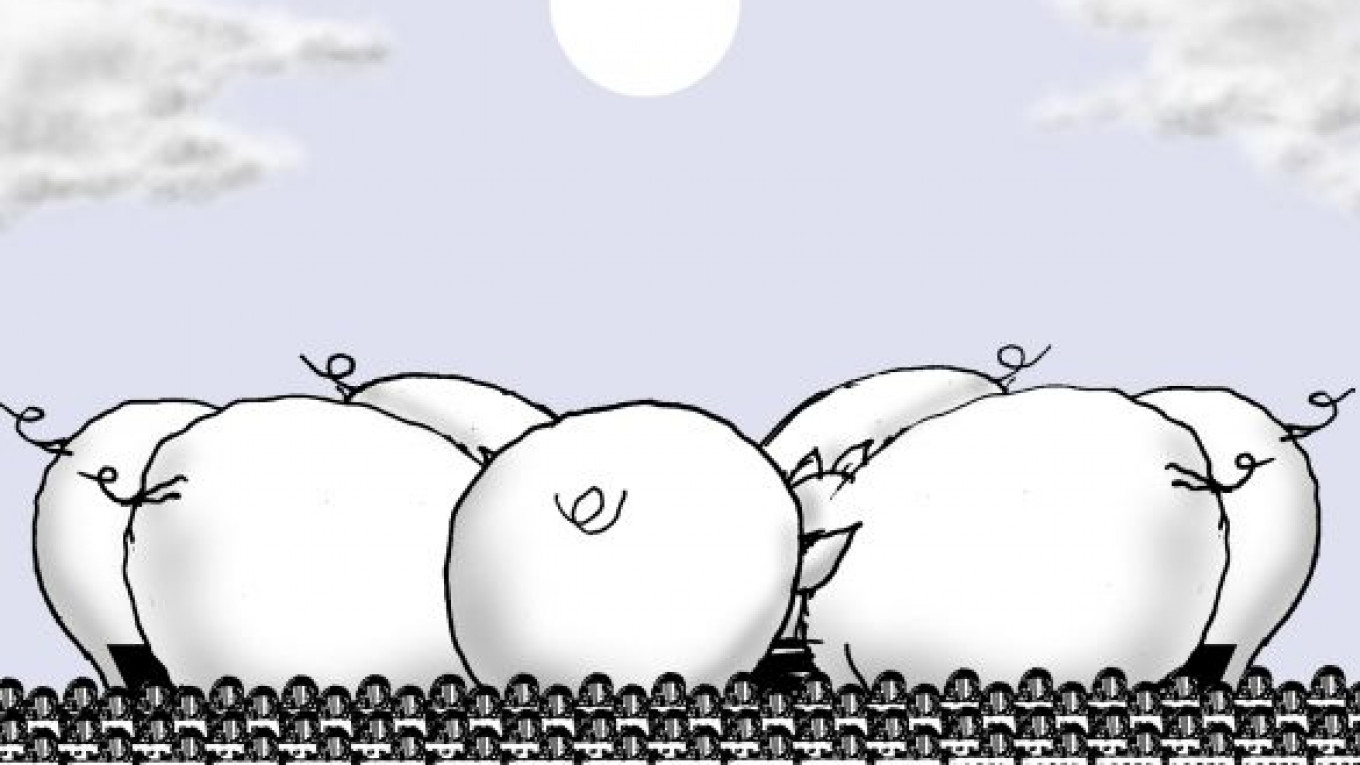The final days of 2010 and the first days of 2011 were filled with unusually turbulent political events for Russia. According to Russian folklore, how we usher in the New Year determines how the next year will pan out, and this year will undoubtedly be no exception.
Prime Minister Vladimir Putin kicked off the new political season on Dec. 16 with his annual call-in show. Putin effectively delivered his own sentence to former Yukos CEO Mikhail Khodorkovsky and his business partner Platon Lebedev two weeks before Judge Viktor Danilkin had delivered a ruling in the case.
In addition, by repeating his assertion that Khodorkovsky was somehow complicit in the contract killings of business rivals and the mayor of Nefteyugansk, the prime minister made it clear that he intends to keep him behind bars for life and that he is prepared to bring a third set of criminal charges against him, if necessary.
In cold-blooded fashion, Danilkin delivered a cruel verdict based on trumped-up charges, ignoring the fact that the second case contradicts the logic of the first and that not a single witness corroborated the charge that the defendants had stolen any oil. Even investigators were unable to explain how Khodorkovsky and Lebedev could have stolen all the oil that Yukos had ever produced.
The key component of Putin’s plan is to create a huge feeding trough for top bureaucrats and Kremlin-friendly businessmen. Moreover, Putin bluntly said that he will not tolerate any opposition groups that pose a threat to this feeding trough.
Completely reversing the tables, Putin singled out myself, Vladimir Milov and Boris Nemtsov for having stolen billions of dollars together with now-exiled oligarch Boris Berezovsky in the 1990s. Moreover, Putin claimed, if these opposition leaders ever gain power, they will sell off the entire country piece by piece. (Milov, Nemtsov and I filed a defamation suit Dec. 23 against Putin in Moscow’s Savyolovsky District Court, demanding 1 million rubles, or $32,600, in damages and that Rossia One television run a retraction.)
Why is Putin intensifying his attacks against the liberal opposition? The main reason is because they are revealing corruption in the highest ranks of the government, including in Putin’s inner circle.
Second, the main elements of the liberal and democratic program — transparency in government, investigation of corruption by senior officials, the return of free and fair elections at all levels, accountability of the siloviki before the public and parliament, an open and deregulated economy and the breakup of monopolies — have the potential to gain widespread popular support and would inevitably lead to the destruction of the political monopoly enjoyed by Putin and United Russia.
Following Putin’s unprecedented attack on the opposition in his call-in show, Nemtsov, Ilya Yashin, Eduard Limonov and a host of other opposition and civic activists were arrested on Dec. 31. It was the first time that arrests have taken place during a rally sanctioned by the authorities. It was also the first time that one of the most prominent opposition leaders, Nemtsov, was given the maximum penalty of 15 days imprisonment. Moreover, the convictions were based on completely falsified charges, turning the court into the latest disgraceful farce. The judge ignored testimony by 13 witnesses upholding Nemtsov’s innocence. She also dismissed defense motions to view video and photographic materials and made her decision based on the reports of two policemen who Nemtsov said were not the ones who arrested him at the demonstration. Prior to that, Nemtsov had been made to sleep for two nights on the concrete floor of a prison cell, and during the hearing the judge denied him a chair, forcing him to stand for 4 1/2 hours.
Putin is determined to hold onto power and his privileged position at the feeding trough using ruthless and dictatorial methods that resemble those employed in Belarus.
Against this backdrop, President Dmitry Medvedev, who hasn’t commented on the verdicts against Khodorkovsky and Lebedev, continued his downward slide into political oblivion. He emerged as president from the shadows, and this is precisely where he is returning.
Vladimir Ryzhkov, a State Duma deputy from 1993 to 2007, hosts a political talk show on Ekho Moskvy radio.
A Message from The Moscow Times:
Dear readers,
We are facing unprecedented challenges. Russia's Prosecutor General's Office has designated The Moscow Times as an "undesirable" organization, criminalizing our work and putting our staff at risk of prosecution. This follows our earlier unjust labeling as a "foreign agent."
These actions are direct attempts to silence independent journalism in Russia. The authorities claim our work "discredits the decisions of the Russian leadership." We see things differently: we strive to provide accurate, unbiased reporting on Russia.
We, the journalists of The Moscow Times, refuse to be silenced. But to continue our work, we need your help.
Your support, no matter how small, makes a world of difference. If you can, please support us monthly starting from just $2. It's quick to set up, and every contribution makes a significant impact.
By supporting The Moscow Times, you're defending open, independent journalism in the face of repression. Thank you for standing with us.
Remind me later.








